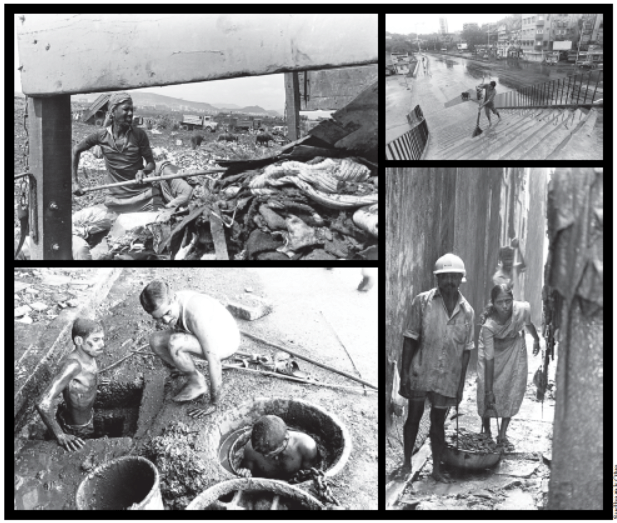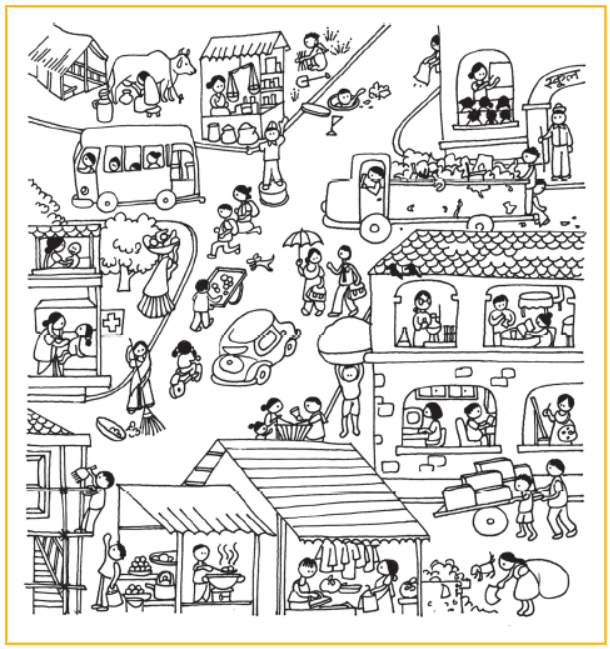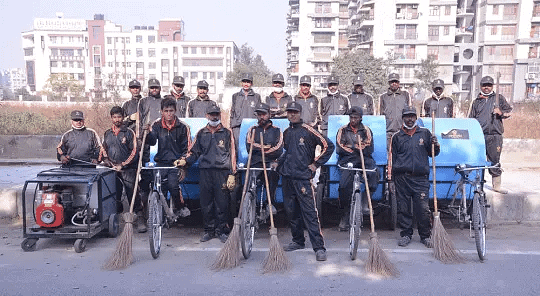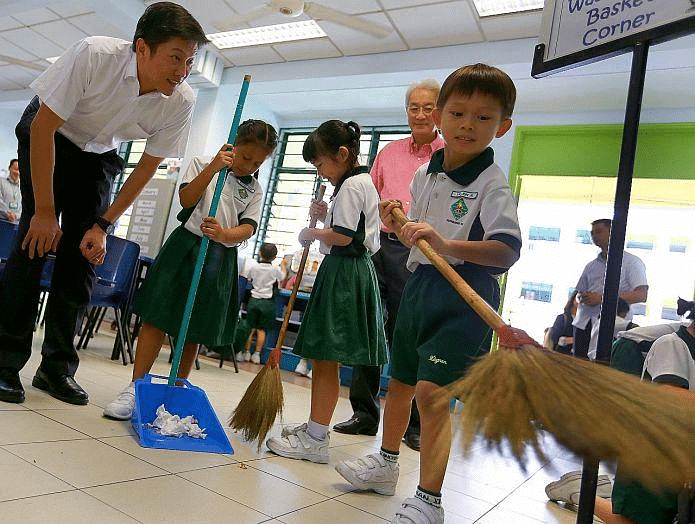NCERT Solutions for Class 5 EVS Chapter 16 - Who will do this work?
| Table of contents |

|
| Have you seen such scenes around you? |

|
| Write |

|
| Discuss |

|
| Imagine |

|
| Tell |

|
| Tell |

|
| What we have learnt |

|
Have you seen such scenes around you?

Ans. Yes, I have seen such scenes around.
1. Have you ever thought of people who do this work? Can you imagine how they would feel?
Ans. The people who have to do this work feel it is very difficult, dirty, hard, and laborious.
2. Why do you think people need to do this kind of work?
Ans. People need to do this work due to poverty.
Write
1. Since When have they been doing this work?
Ans. Our school workers have been employed for 10 years. Our house help has been assisting us for 15 years, starting from my shift there.
2. How much have they studied?
Ans. Most of them have studied only up to 5th class.
3. Have they tried to look for some other work?
Ans. No, they have not tried to look for any other work.
4. Did the elders in their family also do this work?
Ans. Yes, the elders in their families also do this work.
5. What kind of difficulties do they face in doing this work?
Ans. Those who do cleaning jobs encounter several challenges, including:
- Dealing with foul-smelling garbage, which can lead to various health issues.
- Facing discrimination from others, who may view them as part of a low-status community.
- Struggling to find better job opportunities, even after completing their education.

6. What are the different kinds of work being done in this drawing? List any five of these.

Ans. Difficult kinds of work done in the above images are listed here. They are painting the house, working in fields or gardens, carrying goods, sweeping the road, and carrying the garbage.
2. If you were asked to do any five jobs shown in this picture, which would you choose? Why?
Ans. The five jobs I wished to do is teaching, doctor, scientist, shopkeeper, and artist. Because these jobs are easier when compared to the rest.
3. Which five jobs would you not choose? Why?
Ans. Five jobs which I would not choose are sweeper, gatekeeper, construction worker, driver, and cook. I wanted to do a job that satisfies my parents, which gives me more respect and I want to lead a happy life.
Discuss
1. What kind of work or jobs do people not want to do? Why?
Ans. The work which does not require much brain is not challenging, for example, the work of a sweeper, gatekeeper, doing whitewash on building, etc. People do not want these jobs because by these jobs we cannot earn well, they are not challenging and they are not considered respectful.
2. So, who does this kind of work? Why do people do this kind of work that others do not want to do?
Ans. People who do this kind of work are often from poorer backgrounds. The reasons include:
- Lack of funds: Many cannot afford further education to secure better jobs.
- Limited opportunities: Even with qualifications, they struggle to find decent employment.
- Generational roles: This work has been passed down through generations, making it difficult to break the cycle.
As a result, they often feel compelled to continue in these roles.
Imagine
1. What would happen if nobody did this work? If nobody cleared the garbage lying outside your school or your house for one week, then what would happen? Think of some ways so that people would not do the work they don’t like to do. Draw a picture of what you thought.
Ans. If nobody would clear the garbage lying outside our school or our house, there would be-
(i) a lot of garbage accumulated here and there on the roads.
(ii) the place would become very filthy and foul-smelling
(iii) a lot of mosquitoes and other germs would breed in these areas and spread diseases.
Some other ways for cleaning, so that the people would not have to do this work are:
(i) Crane: A crane can be used which carries a huge amount of garbage at a time and does not require people to hold the garbage by hand.

(ii) Dalao: It is a special type of big dustbin in which the garbage is collected. When it gets filled up, a crane or truck is brought and it takes away the whole dustbin as it is.
Tell
1. Why did Gandhiji and his team start doing the job of cleaning? What do you think about this?
Ans. It was the usual practice that people from a particular community would do the job of cleaning. These people were considered untouchable and were hosted by other people. Gandhiji wanted to remove this practice of untouchability from society and also wanted the people to respect each other. Thus, Gandhiji and his team started doing the job of cleaning themselves so that can learn from them.
2. Do you know any such people in your area who try to help others in solving their problems? Find out.
Ans. Yes, there is a lady in our colony who has started an NGO. This NGO is working for the cleanliness of the roads, drains, etc. The people working in the NGO, personally clean and sweep the roads and drains, and thus they are helping others in solving their problems.

3. Guests at Gandhiji’s Ashram had to learn this work also. If you were one of these guests, what would you do?
Ans. If I were a guest at Gandhiji's Ashram, I would:
- Learn the importance of cleaning and service.
- Participate in the work with a positive attitude.
- Understand that every task, no matter how small, contributes to the community.
By engaging in this work, I would not only help maintain the Ashram but also gain valuable life lessons.
4. What are the toilet arrangements in your house? Where is the toilet? Inside the house or outside? Who cleans the toilet?
Ans. In our house, we have a modern toilet located inside. It features a flush system with a small water tank and a button. When the button is pressed, water rushes out quickly to flush away waste. The toilet is cleaned daily to maintain hygiene.

5. How did the man who was returning from the toilet behave with Mehadevbhai? Why did he behave like this?
Ans. The man returning from the toilet spoke to Mahadevbhai in a disrespectful manner, showing clear signs of hatred. He viewed those who clean toilets as belonging to a very low community, considering them untouchables. This belief led him to treat Mahadevbhai with disdain.
6. How do people generally behave toward those people who clean toilets and drains? Write.
Ans. People often treat those who clean toilets and drains with disrespect. This is due to a perception that they belong to a low-status group. Their behaviour includes:
- Avoiding contact with cleaners, viewing them as untouchables.
- Preventing them from entering other parts of the house, such as the kitchen.
- Expressing disdain or discomfort in their presence.
This negative attitude reflects deep-rooted social biases against those in these essential roles.
7. Narayan and Gandhiji discussed all these many years ago. Have things changed now?
Ans. Yes, things have changed a lot now. Nowadays, most people do not believe in untouchability. In fact, the government has also passed many rules in favor of these people according to which misbehaving with these people is punishable by law. The government has also reserved many seats for these people in educational institutions and government jobs.
Tell
1. Who does the cleaning in your school? What all has to be cleaned?
Ans. The cleaning in our school is done by 3-4 sweepers. They have to clean the toilets, all the rooms, the terrace and the grounds of the school.
2. Do all the children as you help in this? If yes, how?
Ans. Yes, sometimes we help with this cleaning work. We clean our classroom. If any waste papers or any other waste are lying here and there, we collect them and throw them in the dustbin. We also clean our benches and chairs.

3. If all do not help, why not?
Ans. Some students in the class, do not help at all. They are belonging to very rich families and they consider their insult work doing this cleaning work.
4. Do all the children do all kinds of work?
Ans. No, all the children do not perform all kinds of work. Those who consider this work as a low-status or insulting work and hate it, do not perform it or do it only superficially.
5. Do they sometimes have to miss classes to do this work?
Ans. No, they do not miss classes to do this work. Instead, they complete it in just 5-10 minutes between classes.
6. Do the girls and the boys do the same kinds of work?
Ans. Yes, the girls and boys do the same kinds of work.
- Both genders participate in similar tasks.
- They share responsibilities equally.
- Work is not divided based on gender.
7. What work do you do at home?
Ans. I do the following work at home:
(i) I clean my room daily. After studying, I arrange all my books and copies properly and do not allow them to spread.
(ii) I also clean my bed daily.
8. Is the work done by boys and girls, men and women the same?
Ans. No, usually the work done by boys and girls, men and women are not the same. The girls and women are usually involved in household jobs like cleaning the rooms, cooking, washing clothes, etc. The boys and men have usually involved the outdoor jobs like bringing vegetables, fruit, oil, and other household things paying electricity bills, etc.
9. Would you like to bring some change? What kind?
Ans. Yes, I would like to bring some changes to this. Girls and women should also be allowed to study so that they can get good jobs and become independent and self-reliant. Moreover, the boys and men should also participate in some household work and help the women.

Discuss
1. Do people look at different kinds of work in the same way? If not, why is this so? Why is it important to bring change?
Ans. No, people do not view different kinds of work in the same way. Many jobs, such as road cleaning and toilet sweeping, are often associated with specific communities. These roles are frequently seen as disrespectable, leading to derogatory treatment of those who perform them. This disparity arises because wealthier individuals typically receive better education, securing higher-paying jobs. In contrast, poorer individuals struggle to afford basic necessities, let alone education, forcing them into low-status jobs.
It is crucial to bring about change for the following reasons:
- To promote equality among all people.
- To foster mutual respect across different job roles.
- To challenge and change societal perceptions of work.
What we have learnt
1. Gandhiji used to say that every person should do every kind of work. How do you feel about this? If everyone followed this, what are the things that would change? What are some changes that will happen in your own house?
Ans. If everyone engaged in all types of work, it would lead to significant changes in society:
- Respect for all jobs: No work would be seen as lowly or disrespectful.
- Equality: People would feel equal, reducing feelings of superiority or inferiority.
- Independence: Everyone would become more self-sufficient.
- End of untouchability: This practice would diminish as all work is valued.
In my own home:
- Men and women would collaborate on household tasks.
- Men would assist with chores traditionally assigned to women.
|
53 videos|388 docs|51 tests
|
FAQs on NCERT Solutions for Class 5 EVS Chapter 16 - Who will do this work?
| 1. What is the main theme of the article "Who Will Do This Work?" ? |  |
| 2. How does the article address the issue of labor class and their significance in society? |  |
| 3. What examples does the article provide to illustrate the challenges faced by manual workers? |  |
| 4. How can society change its perception of manual labor according to the article? |  |
| 5. What lessons can be drawn from the article regarding the future of work and labor rights? |  |




















